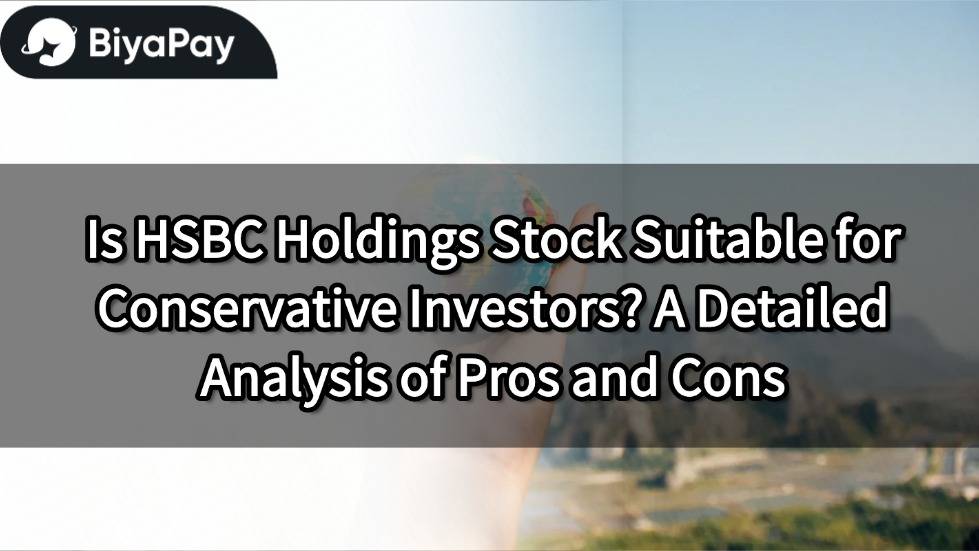- EasyCard
- Trade
- Help
- Announcement
- Academy
- SWIFT Code
- Iban Number
- Referral
- Customer Service
- Blog
- Creator
Is HSBC Holdings Stock Suitable for Conservative Investors? A Detailed Analysis of Pros and Cons

Image Source: unsplash
If you are looking for conservative investments, HSBC Holdings and HSBC Hong Kong stock are worth your attention. According to the latest market data, Asia’s economy shows strong resilience, with a projected growth rate of 4.5% in 2025, far exceeding the global average. As a representative of high-quality Asian stocks, HSBC Holdings benefits from this environment, making it attractive to conservative investors. You can check HSBC’s latest performance and financial status through public financial reports at any time to help you make informed judgments.
Key Points
- HSBC Holdings stock offers stable high dividends and active share buybacks, suitable for investors seeking steady cash flow.
- The company’s financial structure is robust, with multiple indicators showing strong short- and long-term debt repayment capabilities, reducing investment risks.
- HSBC holds a leadership position in the Asian market, benefiting from regional economic growth and rising wealth management demand.
- A diversified business structure helps spread risks, enhancing the company’s resilience across different economic cycles.
- Investing in HSBC requires attention to economic fluctuations, interest rate changes, and business concentration risks, with stop-loss and diversified investment strategies recommended.
Attractiveness

Image Source: unsplash
High Dividends and Buybacks
If you value stable income, the high dividend policy of HSBC Hong Kong stock is worth noting. According to market data, the Hang Seng High Dividend Yield 30 Index ETF has an average dividend yield of about 7.41% year-to-date, while HSBC Holdings has maintained a high payout ratio for a long time. You can see that over the past five years, the annualized dividend yield of high-dividend ETFs has consistently outperformed the broader market, making this stable dividend characteristic particularly attractive to investors seeking passive income.
High-dividend stocks demonstrate stronger resilience during significant market fluctuations. For example, in Q3 2022, the Taiwan stock market fell 15.9%, while high-dividend ETFs only dropped 10.7%. This indicates that a high-dividend strategy helps reduce capital loss risks.
You can also pay attention to stock buyback programs. When a company initiates buybacks, market confidence typically rises. Taking Apple as an example, after announcing a record-breaking buyback plan, its stock price rose 7% on the same day, significantly increasing its market value. This approach reflects the company’s confidence in its own value and directly benefits shareholders. HSBC Holdings has also actively pursued buybacks in recent years, which is a positive signal for conservative investors.
- High dividend yield and stable payouts attract retirees and those seeking steady cash flow like you.
- Stock buybacks help boost market confidence and support stock price performance.
- High-dividend strategies are viable in multiple markets over the long term and are associated with high returns.
Financial Stability
When you choose HSBC Hong Kong stock, financial stability is an important consideration. You can evaluate a company’s health through multiple financial indicators:
| Indicator Name | Calculation Formula | Significance | Stability Explanation |
|---|---|---|---|
| Current Ratio | Current Assets / Current Liabilities | Short-term debt repayment ability | Higher ratio indicates stronger repayment ability; ideal range is about 1.5 to 2. |
| Quick Ratio | (Current Assets – Inventory) / Current Liabilities | Stricter short-term debt repayment ability | Excludes inventory liquidation risks, reflecting more realistic short-term repayment ability. |
| Cash Ratio | (Cash & Cash Equivalents + Short-term Investments) / Current Liabilities | Most conservative short-term debt repayment ability | Considers only the most liquid assets, indicating strong ability to meet short-term debts. |
| Debt Ratio | Total Liabilities / Total Assets | Overall debt level | Higher ratio indicates higher risk; should be compared with industry averages. |
| Interest Coverage Ratio | EBIT / Interest Expense | Ability to pay interest | Higher ratio indicates lower risk; below 1 means inability to cover interest. |
You should refer to multiple indicators simultaneously and compare them with industry averages. HSBC Holdings has maintained good current ratios and debt ratios for many years, indicating a robust financial structure. This stability helps you reduce risks during economic uncertainty.
Asian Leadership Position
HSBC Holdings holds a leading position in the Asian market. You can see that HSBC ranks first in loan business in Hong Kong, with Asia contributing 68.7% of pre-tax profit in the first half of 2022. In Taiwan, HSBC was the first foreign bank subsidiary approved for Wealth Management 2.0 business, actively developing wealth management, demonstrating its growth potential and market focus in Asia.
HSBC Hong Kong stock benefits from Asia’s economic growth, particularly the rising consumption upgrades and wealth management demand in China and Southeast Asia. If you value regional growth potential, HSBC Holdings’ Asian business advantages are worth considering for your investment.
Diversified Business
When you invest in HSBC Hong Kong stock, you can benefit from its diversified business structure. HSBC Holdings covers retail banking, commercial banking, corporate finance, wealth management, and capital markets. This diversification helps spread risks from a single business, enhancing overall resilience.
- You can use performance reports and data visualization tools to quickly understand each department’s performance.
- You can flexibly adjust investment strategies based on annual analyses of different business segments.
- A diversified business structure helps HSBC Holdings maintain stable income across different economic cycles.
If you seek stable growth, choosing HSBC Hong Kong stock, with its diversified business and robust finances, can effectively spread risks and enhance long-term return potential.
Risks

Image Source: pexels
Economic Fluctuations
When you invest in HSBC Holdings, economic fluctuations directly affect the company’s performance. Changes in the global economic environment, such as inflation, exchange rate fluctuations, and regional economic crises, put pressure on banking operations. You can refer to the table below to understand the actual impact of recent economic fluctuations on HSBC Holdings:
| Item | Specific Data or Description |
|---|---|
| 2023 Inflation Impact | Rising costs, with inflation pressure expected to ease after 2025. |
| Argentina Hyperinflation | Peso depreciated over 50% in December, negatively impacting pre-tax profit by about $500 million. |
| 2023 Capital Returns | Distributed $19 billion to shareholders. |
| Stock Buybacks | $7 billion, reducing outstanding shares by over 4%. |
| Expected Revenue Growth Opportunities | Growth potential remains even in a lower interest rate environment. |
| Cost Control & Digital Investment | Ongoing efforts to improve efficiency. |
You can see that regional economic crises (e.g., Argentina’s hyperinflation) cause short-term profit declines for HSBC Holdings. Although the company actively returns capital to shareholders and promotes digitalization, global economic uncertainty remains a risk you need to monitor.
Interest Rates and Regulation
When you invest in bank stocks, interest rate changes and regulatory policies directly affect profitability. The U.S. Federal Reserve considers multiple economic indicators when adjusting policy rates:
- U.S. Non-Farm Payrolls (including non-agricultural employment, unemployment rate, average hourly earnings, labor participation rate).
- Consumer Price Index (CPI).
- Personal Consumption Expenditures Price Index.
These indicators reflect labor market and price changes, influencing the Fed’s decisions to raise or lower rates. When the economy is strong, the Fed raises rates, increasing U.S. dollar interest rates, widening bank net interest margins, and boosting profits. When the economy weakens, the Fed lowers rates, narrowing bank margins and reducing profits. Regulatory policy changes, though lacking real-time data, can be observed through market prices and asset volatility. For example, during the 2020 pandemic, regulators required HSBC to suspend dividends, unsettling many conservative investors. You need to closely monitor the latest developments in interest rates and regulatory policies and adjust your investment strategy promptly.
Stock Price Volatility
When you invest in HSBC Holdings, stock price volatility affects your capital returns. Historical volatility can help you understand the average range of stock price fluctuations over a past period. This indicator is typically calculated using standard deviation, often based on price changes over 10 to 180 trading days. You can use historical volatility to assess whether current volatility is high or low. While historical volatility provides specific range data, it only reflects past performance and is less sensitive to future unexpected events or market sentiment shifts. You should not rely solely on historical volatility to predict future fluctuations and should combine it with implied volatility and other market indicators. Market sentiment, sudden policies, or geopolitical events can cause significant short-term stock price swings, posing a key risk for those seeking stable returns like you.
Tip: You can regularly review volatility indicators and set stop-loss points to minimize losses from sudden fluctuations.
Business Concentration
When you invest in HSBC Holdings, you should also note business concentration risks. Although HSBC Holdings has a diversified business, Asia accounts for a high proportion, particularly Hong Kong and China. When Asia’s economy fluctuates or geopolitical tensions arise, HSBC Holdings’ profits and stock price are significantly affected. For example, in 2022, China’s recurring pandemic and Hong Kong’s slowing banking growth pressured HSBC Holdings’ overall performance. If you only hold HSBC Holdings, you risk capital losses due to single-market risks. You should consider diversifying investments to reduce potential losses from business concentration.
HSBC Hong Kong Stock Strategy
Holding Strategy
If you plan to hold HSBC Hong Kong stock long-term, you can refer to backtested data over different time frames. Over the past 30 days, 90 days, 180 days, and 1 year, yields for these periods have accounted for transaction fees. You can see that long-term returns remain stable under both simple and compound interest calculations. Maximum drawdown ratios are clearly stated, helping you understand potential losses in extreme scenarios. For example, maximum drawdown is calculated as the capital loss from the highest to the lowest point. You can use this data to flexibly adjust your position size, reducing risks from entering at a single point.
- You can periodically review portfolio performance and adjust your investment mix based on market changes.
- Long-term holding helps smooth short-term volatility and enhance overall returns.
Risk Management
When you invest in HSBC Hong Kong stock, you should proactively manage risks. You can set stop-loss points to automatically sell when the stock price falls to a certain level, minimizing losses. You can also diversify investments by allocating funds to different industries or regions to reduce the impact of single-market fluctuations. You should regularly monitor company policies and market dynamics to identify potential risks early. This approach helps you maintain capital safety in uncertain market environments.
Tip: You can use mobile apps to set price alerts and stay updated on market changes in real time.
Suitable Investors
If you seek stable cash flow and value long-term returns, HSBC Hong Kong stock is more suitable for you. Retirees, conservative investors, or those looking to diversify assets can consider including this stock. You need to adjust your position size based on your risk tolerance. If you dislike high volatility or short-term trading, choosing HSBC Hong Kong stock can help you achieve stable growth.
When evaluating HSBC Hong Kong stock, you can refer to the latest financial data, stock price trends, P/E ratio, and dividend policy. Multiple indicators show the company has stable growth potential and high market liquidity. You should prudently determine your position size based on your risk tolerance. Third-party verification standards help enhance information transparency, enabling you to make more informed investment choices.
FAQ
What is the minimum investment amount for HSBC Holdings stock?
You can purchase HSBC Holdings stock in the Hong Kong securities market in lots of 100 shares. At approximately USD 7.5 per share (about HKD 58.5, 1 USD ≈ 7.8 HKD), the minimum investment is around USD 750.
How stable are HSBC Holdings’ dividends?
You can find that HSBC Holdings has maintained stable dividends for many years. Dividends were suspended during the 2020 pandemic but have since resumed. You should regularly check company announcements.
Is HSBC Holdings stock suitable for short-term trading?
If you seek short-term profits, HSBC Holdings’ low volatility may not be suitable. Choosing long-term holding is more likely to yield stable dividends and capital appreciation.
Does HSBC Holdings stock have foreign exchange risks?
When you invest in HSBC Holdings, you should note USD to HKD exchange rate changes. The company operates in multiple currencies, and exchange rate fluctuations affect your final returns.
How can you access HSBC Holdings’ latest financial data?
You can check the latest financial reports on HSBC Holdings’ official website or the Hong Kong Stock Exchange. You can also use third-party financial information platforms for real-time data.
HSBC Holdings’ share price volatility and currency risks, coupled with complex financial report tracking and high investment barriers, limit efficiency, while restricted flexible savings independently curb fund utilization. BiyaPay, an all-in-one financial platform, simplifies processes for instant US and HK stock investments, empowering you to seize global market opportunities. Remittance fees are as low as 0.5%, covering 190+ countries with same-day transfers. Its flexible savings offer a 5.48% annualized return, with daily interest credited automatically and anytime withdrawals, supporting 30+ fiat and 200+ cryptocurrencies, secured by KYC.
Explore BiyaPay today to launch your global wealth journey! Join BiyaPay for streamlined fund management!
*This article is provided for general information purposes and does not constitute legal, tax or other professional advice from BiyaPay or its subsidiaries and its affiliates, and it is not intended as a substitute for obtaining advice from a financial advisor or any other professional.
We make no representations, warranties or warranties, express or implied, as to the accuracy, completeness or timeliness of the contents of this publication.




Contact Us
Company and Team
BiyaPay Products
Customer Services
is a broker-dealer registered with the U.S. Securities and Exchange Commission (SEC) (No.: 802-127417), member of the Financial Industry Regulatory Authority (FINRA) (CRD: 325027), member of the Securities Investor Protection Corporation (SIPC), and regulated by FINRA and SEC.
registered with the US Financial Crimes Enforcement Network (FinCEN), as a Money Services Business (MSB), registration number: 31000218637349, and regulated by FinCEN.
registered as Financial Service Provider (FSP number: FSP1007221) in New Zealand, and is a member of the Financial Dispute Resolution Scheme, a New Zealand independent dispute resolution service provider.



















